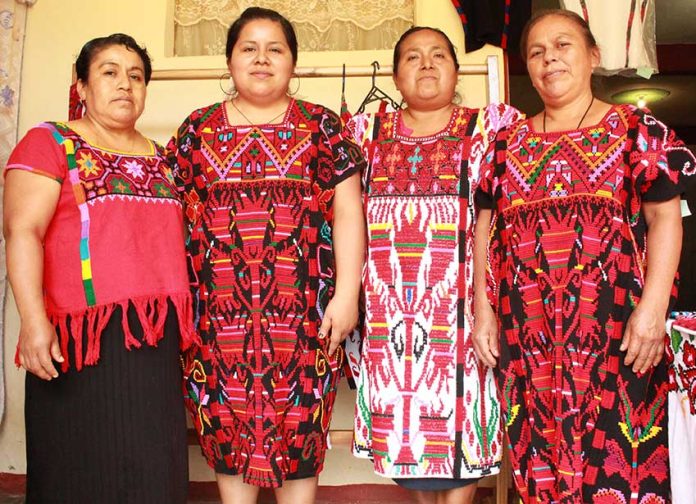Artisans from a small indigenous community in Oaxaca complain that a British clothing retailer is selling imitations of their designs, but they are unsure how to protect their traditional craft.
“Inject some color into your summer wardrobe with the Vita Kaftan. Designed with bold Mexican inspired embroidery in a riot of multi colors.”
That’s how Star Mela’s website advertises a garment which bears a design with a striking resemblance to that featured on the huipiles made by the Chinantec women from Rancho Grande, a town in the municipality of San Juan Bautista Valle Nacional.
The artisans were alerted to the imitation dress, which comes with a hefty price tag of 299 pounds (US $380), via a message on social media.
Despite laboring for long periods of time on a telar de cintura (a traditional backstrap loom) to make their huipiles, the Oaxacan artisans’ prices are much lower.
Paty Rodríguez, president of the artisans’ collective Bordados de Mil Colores, and Lucía Manuel Antonio, representative of Flor de la Chinantla, told the newspaper El Universal that they are unhappy about having their designs plagiarized but explained that they haven’t taken their complaint further because they don’t know where to take it.
In addition, they said they’re afraid that they won’t be listened or that they won’t be able to understand the bureaucratic processes involved.
Instead, they are placing their faith in senator-elect Susana Harp, a folk singer from Oaxaca who won a seat in the upper house as a candidate for the Andrés Manuel López Obrador-led Morena party.
Harp has pledged that she will fight to introduce legislation that protects traditional Mexican textiles.
According to the director of the Oaxaca Institute of Handicrafts (IOA), the only recourse currently available to artisans who have had their designs plagiarized for commercial use is to publicly denounce those who have stolen them.
Miriam Caraveo Cortés added that on the request of the state Congress the IOA has begun drawing up guidelines that could later become law.
Similar cases of plagiarism involving indigenous Mexican artisans have occurred before.
Last year, Spanish multinational company Mango was accused of copying the unique embroidery designs of artisans from Hidalgo and consequently took the products in question off the market.
French designer Isabel Marant and Argentine label Rapsodia have also been accused of appropriating traditional Mexican designs.
Source: El Universal (sp)
